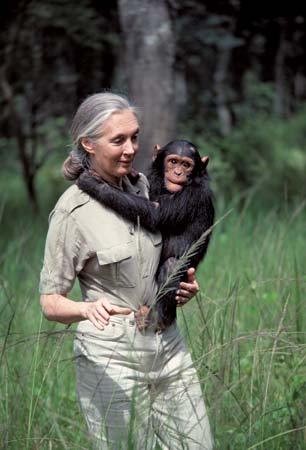An amusing headline in a prominent California paper reads: ”What Separates Us From Chimps.” Though it may sound like a tautology, what separates us from chimps is separating ourselves from chimps, and everything else.
Scientists have pinpointed a few of the differences in the 1% of DNA we do not share with our closest primate cousins. They appear to be associated with “accelerated evolutionary changes” in genes associated with speech, hearing and brain development.
For example, there is evidence that hearing in humans was “specially tuned by natural selection to make possible the elaborate spoken language capability unique to humanity.”
Teasing out genetic differences will never give us a better understanding of ourselves however. Besides, even in terms of aggression and war, human and chimp natures may not be so different after all. (Bonobos have pacific and loving natures, but they have evolved strong pacifying behaviors that nip aggression in the bud.)
 Primatologists have observed certain species of chimpanzees engaging in clearly planned hunting of other primates—for example, smaller and dumber rhesus monkeys. Jane Goodall has also observed, to her horror, the systematic extermination of one group of chimps by a rival group. Genocide in chimps, our closest cousins! Does nature go wrong with the evolution of so-called higher thought?
Primatologists have observed certain species of chimpanzees engaging in clearly planned hunting of other primates—for example, smaller and dumber rhesus monkeys. Jane Goodall has also observed, to her horror, the systematic extermination of one group of chimps by a rival group. Genocide in chimps, our closest cousins! Does nature go wrong with the evolution of so-called higher thought?
There is something inherently anthropocentric in seeking to find “the essence that makes us human.” Embedded within the phrase is the idea that the power and domination humans wield over other animals and each other somehow makes us special. However given that humans, a sentient and supposedly intelligent species are in the process of bringing about the Sixth Mass Extinction in history of life on earth, it actually means just the opposite.
The cheesy “Planet of the Apes” movies did have one interesting idea. The basic premise of the series (I lost track after three) was that if other apes were as smart as us, they would be just as speciesist and destructive as humans. If Goodall’s observations are any indication, then that idea has legs.
This raises another question: given the right conditions and enough time, do all earthlike planets inexorably produce consciously thinking species that foul and denude their planets until and unless they make the transition to true intelligence and consciousness?
As a person who has had so-called mystical experiences since his teens, allow me to introduce another dimension into this debate. When thought is completely quiet in unforced, unwilled attention, there is direct perception of beauty, wholeness and sacredness.
I’m not talking about any deity, but the unknowable essence (in the sense of words, concepts and knowledge) that permeates the universe. Time and space, matter and energy are seen and felt as an undivided, unfolding movement of wholeness, within which impersonal love and compassion intrinsic.
I feel no need to convince anyone of the existence of this actuality, even if there was a way I could say anything more about it. But it is a great curiosity to me that the human brain, which is dominated by symbolic thought, is fragmenting the earth and humanity all to hell, also has the capacity of being consciously aware of inviolability beyond all knowledge.
Perhaps that defines the “riddle of man.” I may have resolved it philosophically, but each of us has to resolve in our own hearts and minds.
Apparently a brain capable of conscious thought, whose basic principles are separation and manipulation, is a prerequisite for awakened consciousness. But that very evolutionary development initiates the ongoing existential mistake (“original sin,” in Christian lingo) of psychological division. The arrogance of human domination and technology precludes the full awakening of insight essential to end the fragmentation of the earth and ourselves.
The ages of man have ended. The pressure is growing in every responsible human being for transmutation, in direct proportion to man’s plundering of the planet.
Our age requires an evolutionary leap in our understanding and application of ‘higher thought’ in a sufficient number of people to make the transition to a genuinely intelligent species.
Martin LeFevre
No comments:
Post a Comment